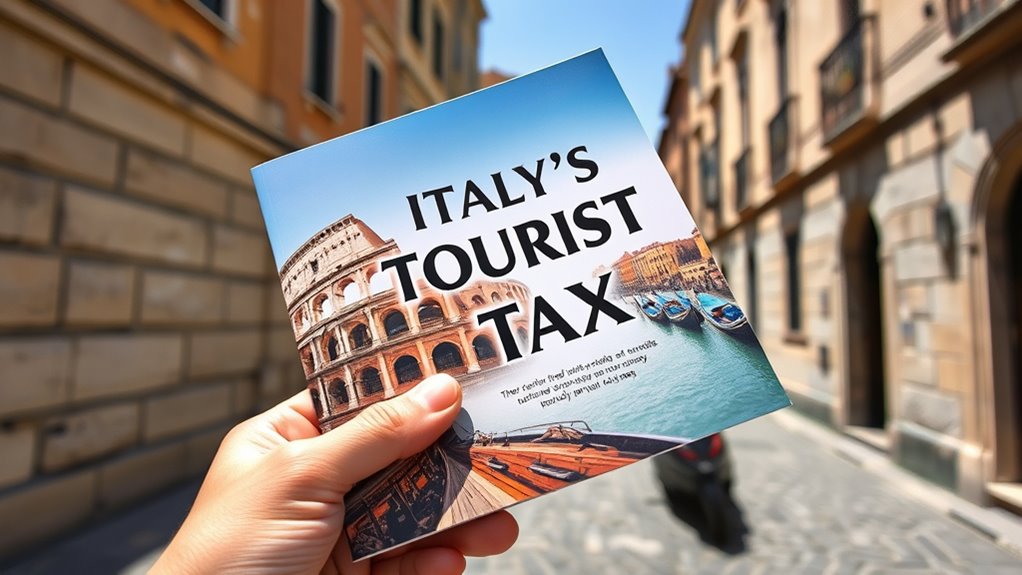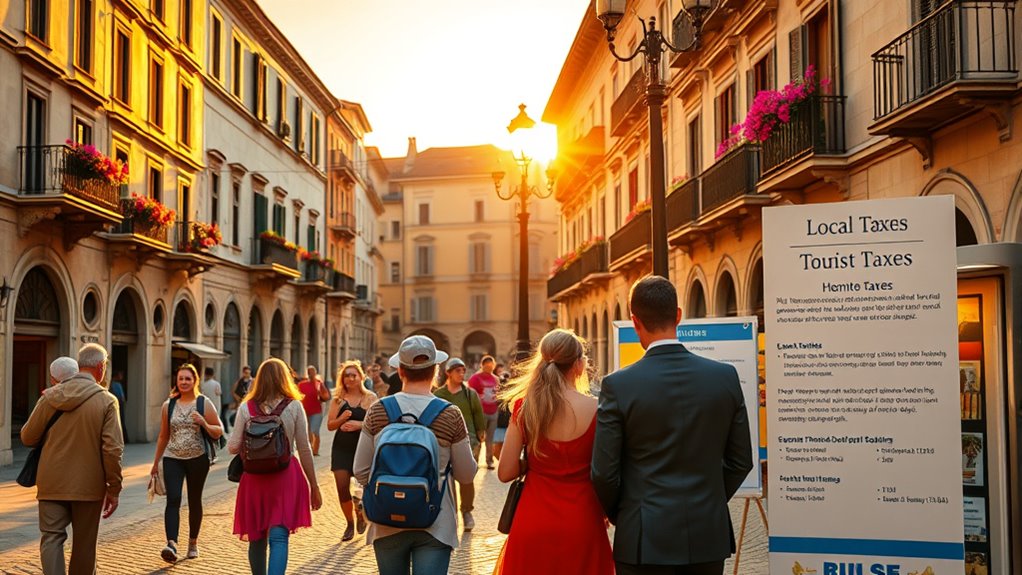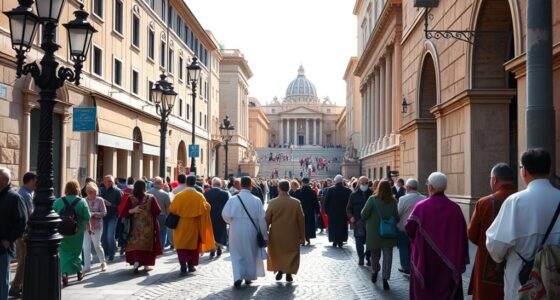When visiting Italy, you’ll encounter a mandatory local tourist tax that varies by city and accommodation type, helping fund public services like cleaning and security. The fee can differ based on the location, hotel rating, and season, with some exemptions for children, residents, or certain lodging. In major cities, the tax is often included during booking or check-in. To avoid surprises and plan your budget, it’s helpful to understand how this tax works—more details await.
Key Takeaways
- Italy’s tourist tax is a local, mandatory fee added to hotel bills to fund city services and infrastructure.
- Rates vary by city, accommodation type, and season, often based on star rating or room category.
- Children, residents, and certain accommodation types may qualify for exemptions or discounts.
- Payment methods and inclusion in bills differ; in major cities, it’s often automatic at booking or check-in.
- Always verify local rules beforehand to avoid surprises and ensure compliance with regional tax regulations.

Ever wondered what the extra fee on your hotel bill in Italy is for? That small charge is most likely the local tax, a mandatory fee that cities and towns levy on tourists to help fund local services and maintain public spaces. Unlike national taxes, this local tax varies depending on the city, the type of accommodation, and sometimes even the season. Some regions might charge a flat rate per night, while others base it on the hotel’s star rating or room category. The purpose behind this fee is to ensure that visitors contribute to the upkeep of the area they’re enjoying, from cleaning and security to infrastructure improvements. It’s also important to note that local tax regulations can change frequently, so staying informed can help you avoid unexpected charges. You might be relieved to know that Italy offers fee exemptions for certain travelers. For example, children under a specific age—often 10 or 12—are usually exempt from paying this tax. Additionally, stays in some types of accommodations, like hostels, guesthouses, or agriturismos, may qualify for reduced rates or exemption depending on local rules. If you’re staying for an extended period, certain municipalities might also offer exemptions or discounts, especially if you’re a resident or visiting for work or study. It’s worth checking with your accommodation beforehand to understand whether you’re eligible for any fee exemptions, as this can save you a bit of money and avoid surprises on your bill. Understanding that this tax is separate from the city tourism tax or city tax is important, as each municipality may have different rules and rates. Some cities, like Venice, Florence, or Rome, are especially strict about collecting this fee, and they often include it automatically during the booking process or at check-in. However, in smaller towns or less touristy areas, the process may be less formal, and you might need to pay the fee directly at the hotel or accommodation. Knowing about these fee exemptions can help you plan better and avoid overpaying, especially if you qualify for any discounts.

OLIXIS 28 Inch Luggage, Hardside Checked Suitcase with Spinner Wheels, Lightweight ABS Hard Shell Travel Luggage, TSA Approved Lock, Expandable Large Suitcase for Business & Travel–Blue
Smooth & Effortless Mobility: Equipped with 360° spinner wheels that glide smoothly and silently across all surfaces. The…
As an affiliate, we earn on qualifying purchases.
As an affiliate, we earn on qualifying purchases.
Frequently Asked Questions
Are There Any Exemptions From Paying Italy’s Tourist Tax?
You may be exempt from Italy’s tourist tax if you meet specific exemption criteria or belong to certain special visitor categories. For example, some regions waive the fee for children under a certain age, long-term stays, or residents. Always check local regulations beforehand, as exemptions vary by area. If you qualify, you should carry proof of your status to avoid paying the tax upon check-in.
How Is the Tourist Tax Collected at Accommodation Check-In?
Ever wondered how the tourist tax gets added during check-in? You’ll typically pay it as part of the check-in procedure, either in cash or card, depending on the accommodation’s payment process. When you arrive, the staff will inform you of the amount due, and you’ll settle it before getting your keys. This straightforward process guarantees you’re compliant without any surprises, making your stay hassle-free.
Does the Tourist Tax Apply to Day-Trippers or Only Overnight Guests?
The tourist tax generally applies only to overnight guests, not day-trippers. Day trip regulations often exclude visitors who stay for a few hours, so they usually don’t pay the tax. However, some regions may have specific tax exemption policies for short visits, so it’s smart to check local rules. If you plan a day trip, verify whether you need to pay or if you’re exempt to avoid surprises.
Can Tourists Claim a Refund for the Tourist Tax?
Imagine your trip as a journey through Italy’s enchanting streets, and the tourist tax as a toll for a fleeting glimpse. You might be able to claim a refund if you’re eligible, but it depends on specific rules. To navigate the tax refund process, check the local guidelines and keep your receipts. Refund eligibility varies, so act promptly and follow the proper steps to reclaim your money.
Are There Different Rates for Different Italian Regions?
Yes, you’ll find regional variations in Italy’s tourist tax rates. Different regions and cities set their own tax rate differences, which can affect your overall costs. For example, popular destinations like Venice and Rome often have higher rates than smaller towns. When planning your trip, check local regulations to understand the specific tax rate differences so you can budget accordingly and avoid surprises upon arrival.

Money Belt for Travel, Slim RFID Blocking Women and Men Hidden Travel Pouch Under Clothes, Passport Holder Protect Cash Credit Card with 10 RFID Sleeves
【FULL PROTECTION WITH RFID TECHNOLOGY】The money belt for travel for men hidden designed with RFID Blocking and anti-theft…
As an affiliate, we earn on qualifying purchases.
As an affiliate, we earn on qualifying purchases.
Conclusion
Now that you know the ins and outs of Italy’s tourist tax, think of it as a small pebble in your shoe—initially noticeable, but easy to manage once you’re aware of it. By understanding how it works, you can navigate your trip smoothly, avoiding surprises and enjoying the journey. Keep this knowledge in your pocket like a trusty map, guiding you through Italy’s vibrant streets and unforgettable experiences without missing a beat.

Rick Steves Italy Planning Map: Including Rome, Florence, Venice & Siena City Maps
As an affiliate, we earn on qualifying purchases.
As an affiliate, we earn on qualifying purchases.

travel inspira Luggage Scale, Portable Digital Hanging Baggage Scale for Travel, Suitcase Weight Scale with Rubber Paint, 110 Pounds, Battery Included – Silver
[Travel without stress] This hanging baggage scale easily prevents overweight baggage charges; a must-have for traveling. *The isolation…
As an affiliate, we earn on qualifying purchases.
As an affiliate, we earn on qualifying purchases.









